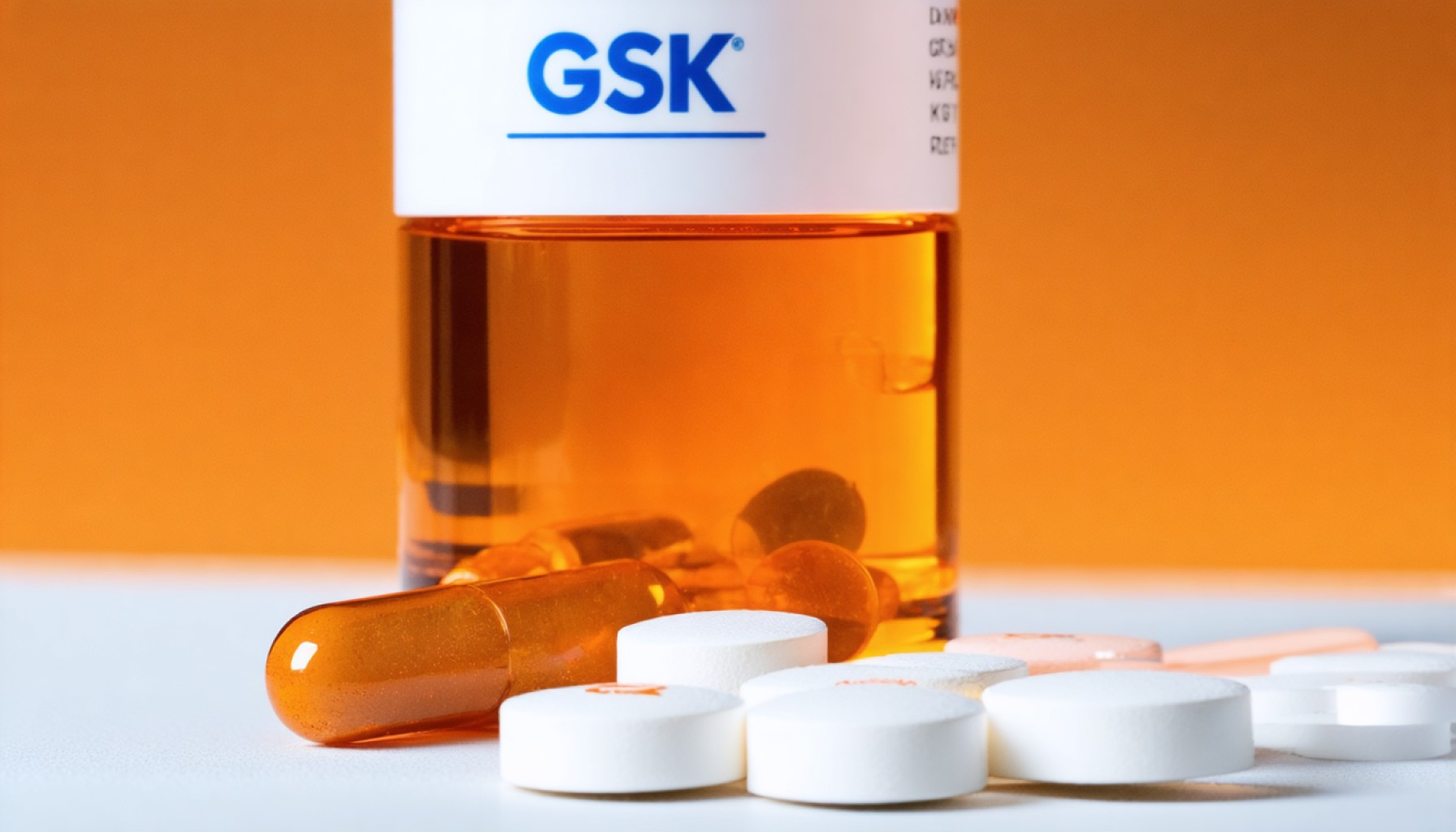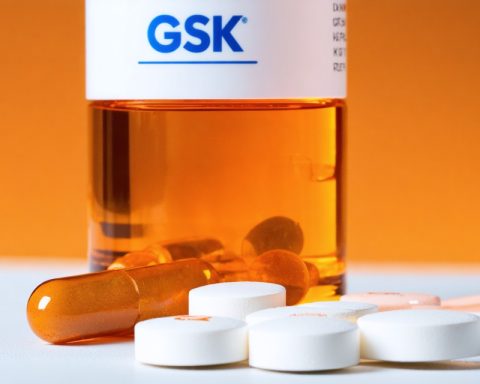- The pharmaceutical industry is a key player in innovation, with a 2022 market value of $516.48 billion, and is anticipated to grow by 7.63% annually until 2030.
- Drug development is challenging and costly, with only 14% of drugs in trials reaching the market and development costs often exceeding $1 billion.
- Artificial intelligence (AI) could revolutionize drug discovery by efficiently analyzing vast datasets to speed up finding effective medications.
- GLP-1 drugs, initially used for weight loss, show promise for treating obesity-related conditions and could drive a $130 billion market by 2030.
- GSK plc (NYSE:GSK) is a major player in immunology, respiratory, and vaccines, with analysts predicting nearly 30% potential upside in share value.
- Pharmaceutical companies are exploring cell and gene therapies, preparing for future industry shifts and potential leadership in innovation.
Amid a world constantly seeking breakthrough therapies, the pharmaceutical industry stands as a bastion of innovation and resilience. It’s an arena where every flicker of progress promises to reshape lives. The sector, hailed for its defensive nature, saw a vibrant $516.48 billion in pharmaceutical manufacturing in 2022, poised to grow impressively at 7.63% annually through 2030.
The vastness of this field isn’t without its challenges. Consider that producing a single viable drug can cost over $1 billion and only 14% of those in trials make it to market. Yet, the promise of AI looms large, potentially revolutionizing drug discovery by sifting through vast datasets to unearth potent medicine combinations faster and more efficiently.
Moreover, pharmaceutical companies are keenly exploring GLP-1 drugs, initially spotlighted for weight loss. These drugs might redefine treatments for conditions linked with obesity, broadening their appeal in industries projected to soar to $130 billion by 2030. With acquisitions like Roche’s $3.1 billion move for Carmot Therapeutics, the race to lead the anti-obesity charge intensifies.
Into this landscape steps GSK plc (NYSE:GSK), a veteran in the pharmaceutical arena. With its robust portfolio in immunology, respiratory therapies, and vaccines, GSK stands tall yet remains undervalued. Analysts spotlight a price target upside of nearly 30%, revealing a hidden potential that may entice savvy investors. As the global heavyweight seeks to bolster its position, understanding this dynamic company’s role amidst change and competition becomes crucial.
Eyeing the horizon, one can’t discount the potential for significant shifts as pharmaceutical titans veer towards cell and gene therapies. For those with an eye on the future, companies like GSK might not just weather the storm—they could lead it.
The Future of Pharmaceuticals: How Innovations Could Transform Your Health
How-To Steps & Life Hacks: Navigating the Pharmaceutical Sector
1. Stay Informed on Industry Trends: Keeping up with pharmaceutical advancements can be overwhelming. Utilize resources like medical journals, industry reports, and reputable websites to stay informed.
2. Understand Drug Costs: If you’re a consumer, it’s important to recognize how drug pricing works. Engage with your healthcare provider to talk about generic options or patient assistance programs.
3. Embrace AI-Driven Healthcare: Keep an eye on how AI is set to revolutionize drug discovery, which could lead to more personalized and efficient treatment options.
Real-World Use Cases: AI in Drug Discovery
AI is dramatically reducing the time and cost of drug discovery. For instance, companies like Insilico Medicine are using AI to identify new drug candidates within weeks instead of years, as demonstrated by their recent partnership with major pharmaceutical firms.
Market Forecasts & Industry Trends
The pharmaceutical industry is projected to grow significantly. Key trends include:
– Annual Growth: The industry is expected to expand at a compound annual growth rate (CAGR) of 7.63% through 2030, reaching an estimated market value of over $1 trillion (source: Grand View Research).
– Expanding Markets for GLP-1 Drugs: Originally designed for diabetes management, these drugs are now being explored for weight loss, with the market for obesity treatment drugs predicted to reach $130 billion by 2030 (source: Market Research Future).
Reviews & Comparisons: GSK vs. Competitors
While GSK remains a strong player in respiratory therapies and vaccines, competitors like Pfizer and Moderna have gained attention for their work with mRNA vaccines. However, GSK’s focus on immunology and undervalued stock presents a unique investment opportunity.
Controversies & Limitations: Challenges in Pharmaceutical Innovations
Drug development faces high costs and low success rates, with only 14% of drugs in clinical trials advancing to the market (source: PhRMA). Emerging challenges include navigating regulatory approvals and addressing ethical concerns in AI use.
Features, Specs & Pricing: GSK’s Portfolio
GSK specializes in vaccines, respiratory, and HIV products. Their strong emphasis on research and development supports the production of cost-effective medicines across diverse therapeutic areas.
Security & Sustainability in Pharmaceuticals
Pharmaceutical security includes ensuring the integrity of supply chains and combating counterfeit drugs. Sustainability efforts focus on reducing the environmental impact through green chemistry practices and minimizing waste.
Insights & Predictions: The Rise of Cell and Gene Therapies
Pharmaceutical giants are heavily investing in cell and gene therapies, which offer potential cures rather than chronic treatment. Investors are watching this space for long-term potential and transformative healthcare solutions.
Tutorials & Compatibility: Integrating AI into Pharmaceutical R&D
Pharmaceutical companies adopting AI must ensure compatibility with existing R&D processes. Training programs for researchers and developers can ease this transition and maximize AI’s potential.
Pros & Cons Overview
Pros:
– Innovation: Rapid advancements in technologies like AI and biotechnology.
– Growth Potential: Significant market growth with high ROI opportunities.
– Improved Patient Outcomes: Personalized medicine is on the rise.
Cons:
– High Development Costs: Drug development requires substantial investment.
– Regulatory Challenges: Stringent regulations can delay progress.
– Ethical Concerns: The use of AI in medicine raises privacy issues.
Actionable Recommendations
1. Invest Smartly: Consider diversifying your investment portfolio with undervalued pharmaceutical stocks like GSK, which have shown potential according to analysts.
2. Leverage Technology: If you work in healthcare, explore AI-driven solutions for patient care and drug prescriptions to enhance efficacy.
3. Advocate for Policy Change: Engage in dialogue around regulatory issues to support smoother pathways for innovative therapies.
For more comprehensive information about pharmaceuticals and other global industries, visit Grand View Research.









